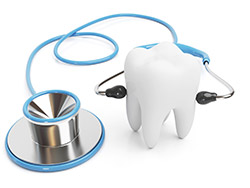Dental Emergencies

We offer same day appointment for our patients with dental emergencies. Just like a medical emergency, a dental emergency can occur at any time and without prior warning. The most common dental emergencies are dental/facial injuries and acute infections of the teeth, gums and the supporting bone.
At the onset of any dental emergency, it is important that you contact our office right away so that we can evaluate your condition, repair the damages and therefore prevent future complications. Accidents do happen, and seeking treatment promptly can mean the difference between saving or losing a tooth and fixing a problem in its early stages or dealing with permanent damages in the future.
So, at the onset of any dental emergency, please contact our office immediately!
Here are some helpful tips about what to do in the most common dental emergencies:
Knocked-out tooth
A knocked-out tooth can be successfully implanted back into its socket ideally within 1 hour after the accident.
Steps to take:
- Pick up the tooth by the crown and carefully rinse it off with water without touching or scrubbing the root
- If possible, gently place the tooth back into its socket
- If it is not possible to do that, you can either place it in a cup of milk or a medical storage solution that you can buy at any drug store
- A proper storage environment increases the success rate of re-implantation
- Get to our office immediately so Dr. Keselbrener could determine whether or not the tooth can be re-implanted
Fractured or broken tooth
If the tooth has been fractured or broken, it needs to be checked by the dentist as soon as possible to evaluate the severity and extent of the damage and to determine the most effective way of treating it.
Steps to take:
- Rinse and save any broken pieces and tooth fragments
- Rinse your mouth with lukewarm water
- If there is any bleeding, apply gauze to the area for 10-15 minutes
- Place a cold compress on the outside of the mouth near the broken tooth to minimize swelling and relieve pain
- Take over-the-counter medication (such as Tylenol/Advil) to relieve pain if necessary
- Contact our office as soon as possible to make an appointment with Dr. Keselbrener
Soft Tissue injuries
Soft tissue injuries include injuries to the tongue, cheeks, gums and lips and often require cleaning of the sore spots and/or the application of stitches to promote healing.
Steps to take:
- Gently rinse your mouth with salt water (1/2 teaspoon of table salt per 1 cup of water)
- Apply pressure to the bleeding site using a piece of gauze for 10-15 minutes
- Apply a cold compresses next to the affected area to minimize swelling and relieve pain
- Get to our office promptly, so Dr. Keselbrener could evaluate and treat the injured site
Toothache
In most cases, toothaches are caused by problems inside the tooth or surrounding tissues, such as:
- Dental caries (tooth decay)
- Pulpitis, an inflammation of the deep part of the tooth containing nerves and blood vessels
- Periodontitis, an inflammation of the tissues that surround and support the tooth
- Fractured, cracked or broken teeth as a result of injuries or trauma
- Objects caught between the teeth
- Wisdom teeth
Steps to take:
- Gently rinse your mouth with lukewarm salt water (1/2 teaspoon of table salt per 1 cup of water)
- Use dental floss or an inter-dental cleaning aid to try to gently remove any food or other debris which may be stuck between the teeth
- Take over-the-counter medications (such as Tylenol/Advil) to relieve pain if necessary
- Contact our office as soon as possible to make an appointment with Dr. Michael Keselbrener so he could examine tour tooth
Here are some simple precautions that can be taken to prevent dental emergencies:
- Always wear a professional sports-guard when participating in sports or recreational activities
- Avoid chewing on ice, popcorn kernels and hard candy, all of which can crack a tooth
- Wear a custom-made professional mouth-guard to prevent tooth friction and abrasion if you are a person who has grinding and/or clenching problems
- Follow proper oral hygiene practices, including excellent dental home care (brushing and flossing) and regular professional dental cleanings to prevent tooth decay and periodontal disease
- Dental sealant application for children and adults that are prone to tooth decay
- Regular dental check-ups that allow hidden dental problems to be noticed and taken care of in its early stages



